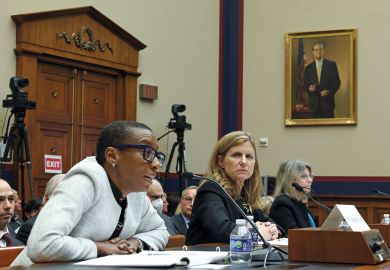US congressional Republicans are resuming their pursuit of Columbia University’s president, Baroness Shafik, insisting she appear before a public hearing of the type that led to the ousting of two of her Ivy League colleagues.
Baroness Shafik will testify next month before the Committee on Education and the Workforce of the Republican-led House of Representatives, in what the committee described as not a “voluntary” decision by the British-American economist.
The moment is scheduled for about four months after a similar event with new female presidents of elite US universities that Republicans described as a campaign against antisemitism, but which many in academia feel has been an attempt to challenge alleged liberal political agendas in higher education.
Shortly after that previous hearing in December, two of the three presidents – Claudine Gay at Harvard University and Elizabeth Magill at the University of Pennsylvania – were forced to quit by a combination of political and donor pressures.
Their removals – supported by many on their institutions’ own governing boards, bending to donor demands – stood for many in US higher education as an especially alarming moment of the acceleration in recent years of conservative attempts to dictate academic agendas.
Baroness Shafik had also been invited to the December hearing, but declined, saying she already had made plans to attend the UN’s global climate summit in the United Arab Emirates. She was not formally subpoenaed to attend the April event, but is not regarded as coming voluntarily, said a spokesperson for the education committee.
A Columbia University spokesperson declined to comment on that aspect, issuing only a single-sentence statement: “Columbia is committed to combating antisemitism and we welcome the opportunity to discuss our work to protect and support Jewish students and keep our community safe.”
The hearing is part of a series of education committee investigative activities arising from the escalation in armed conflict between Israelis and Palestinians in early October, which has led so far to the deaths of about 1,200 Israelis and foreigners in the country and about 30,000 Palestinians trapped in Gaza.
Conservative donors and politicians in the US responded to the violence by arguing that many expressions of support for the Palestinians – often occurring on college campuses – represented acts of antisemitism. The House education committee has been holding hearings on the matter aimed almost exclusively at protecting Jewish students, despite numerous campus protests and abuses on both sides of the political divide.
Professor Gay and Professor Magill – along with Sally Kornbluth, the president of the Massachusetts Institute of Technology – were repeatedly accused by Republican lawmakers at the December hearing of being inattentive to reports of antisemitic activity on their campuses.
In its most recent such hearing, about two weeks ago, the House education committee gave Jewish students from several universities a public platform to air their concerns. One of them, Eden Yadegar, an undergraduate serving as president of Columbia’s chapter of Students Supporting Israel, described mob attacks against her group on campus, saying they turned her decision to attend Columbia from a dream “into a nightmare”.
Ms Yadegar told the lawmakers that Columbia showed “very, very obvious discrimination” by banning campus groups that support Palestinians, but then not doing enough to enforce those bans.
Baroness Shafik will be joined at the April hearing by the two co-chairs of Columbia’s governing board, Claire Shipman, a former political reporter with ABC News, and David Greenwald, a corporate attorney.
Register to continue
Why register?
- Registration is free and only takes a moment
- Once registered, you can read 3 articles a month
- Sign up for our newsletter
Subscribe
Or subscribe for unlimited access to:
- Unlimited access to news, views, insights & reviews
- Digital editions
- Digital access to THE’s university and college rankings analysis
Already registered or a current subscriber?








